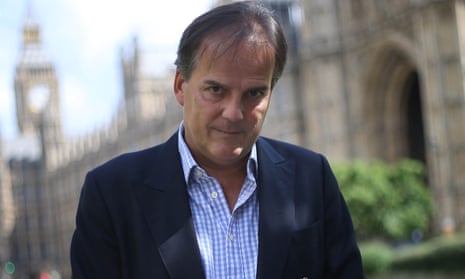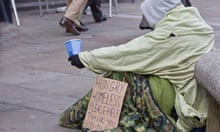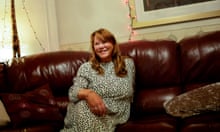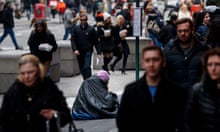The suspended minister Mark Field has referred to a homelessness charity in his constituency as a “magnet for undesirables” in a leaked email, the Guardian can reveal.
Field was suspended as a Foreign Office minister in June after the release of a video that showed him pushing a female Greenpeace activist against a pillar and grabbing her neck while she protested at the chancellor’s Mansion House speech.
He faces fresh criticism after revelations that he described The Passage, a local charity in Westminster, central London, that helps vulnerable and homeless people, as a “magnet for these undesirables to flood into Victoria”.
Field said: “It is high time that The Passage … started to take a little more responsibility for its ‘clients’.”
The MP, who lives in Westminster, made the remark in response to an email from a neighbour who complained about the level of antisocial behaviour linked to homeless people in the area.
The resident said: “The soup kitchens which act like a magnet for not just vagrants but also drug dealers with consequences that have been sufficiently highlighted by my neighbours in words and images … Day in and day out, night in and night out we see the same faces sleeping rough, same voices shouting and swearing, same sleeping bags in the same places.”
She continued: “We have seen mothers grasping their children on their way to school while loud and inappropriate discussion takes place among homeless in the street … Many of these problems are caused by people with mental health, alcohol and drug abuse issues who should not be there. Many of them are not British.”
The email concluded: “Ultimately this is a police responsibility. The police numbers have, however, been substantially reduced.”
He replied to the email, copying in Westminster council figures and Michael Gove, the environment secretary. Field said: “I would totally endorse every word [of the email]”, before going on to criticise the local charity for their handling of the situation.
The Guardian contacted The Passage but it said it did not want to comment.
Stephen Robertson, the chief executive of the Big Issue Foundation, said the use of “pejorative terminology to describe marginalised people” had “no place in this day and age”.
He said: “It serves only to stigmatise individuals, questioning their fundamental legitimacy and reinforcing the impossibility of tackling societal challenges. The use of xenophobic discriminatory shorthand betrays deeply held prejudices that serve only to injure and harm the recipients. When used within powerful institutions it promotes as acceptable beliefs that can consciously and subconsciously influence policy and practice for the worse.”
Field said: “Clearly since the accession of 10 new EU members in 2004 – I should say at this point that my late mother was born in modern-day Poland – there is little doubt that a significantly higher proportion of the homeless on the streets around Westminster Cathedral are from overseas, but simply stating that fact is not in my view necessarily xenophobic.”
He noted he was “reiterating in verbatim form the strength of local opinion” he had “received from residents and constituents with regards the marked deterioration in and around Westminster Cathedral Piazza.”
He said: “Even as a Conservative MP, I have made strong representations to the current government about this worsening trend … I shall continue to offer my support to the local authorities and charities, such as The Passage, who I recognise do such vital work in our community.”
Dan Jarvis, the Labour MP for Barnsley Central, said it was worrying homelessness was becoming increasingly normalised in society. He said: “We should always remember that these are our fellow citizens and choose our words carefully and responsibly. The government needs to concentrate on working towards a compassionate and practical solution to eradicate rough sleeping.”
A spokesperson from the Labour Homelessness campaign said Field’s comments were disturbing and called on him to resign.
“Mark Field represents an area with extremely high levels of homelessness – he has hundreds of rough sleeping constituents, and it’s extremely disturbing to see what contempt he holds them in … Westminster deserves better – for degrading and threatening the vulnerable people and dedicated charity workers and volunteers in his constituency, Mark Field should resign.”
Quick GuideRough sleeping and homelessness in the UK
Show
Is rough sleeping getting worse?
The government claims rough sleeping in England fell for the first time in eight years in 2018, from 4,751 in 2017 to 4,677. But the body that oversees the quality of official statistics in the UK has said the number should not be trusted after 10% of councils changed their counting methods. Rough sleeping in London has hit a record high, with an 18% rise in 2018-19.
The numbers of people sleeping rough across Scotland have also risen, with 2,682 people reported as having slept rough on at least one occasion.
Shelter, whose figures include rough sleepers and people in temporary accommodation, estimate that overall around 320,000 people are homeless in Britain.
What’s being done about rough sleeping?
The government’s Homelessness Reduction Act 2017, which places new duties on state institutions to intervene earlier to prevent homelessness has been in force for more than a year, but two thirds of councils have warned they cannot afford to comply with it. In 2018, James Brokenshire, the housing secretary, announced a one-off £30m funding pot for immediate support for councils to tackle rough sleeping.
How does the law treat rough sleepers?
Rough sleeping and begging are illegal in ENgland and Wales under the Vagrancy Act 1824, which makes ‘wandering abroad and lodging in any barn or outhouse, or in any deserted or unoccupied building, or in the open air, or under a tent, or in any cart or wagon, and not giving a good account of himself or herself’ liable to a £1,000 fine. Leading homelessness charities, police and politicians have called on the government to scrap the law.
Since 2014, councils have increasingly used public space protection orders to issue £100 fines. The number of homeless camps forcibly removed by councils across the UK has more than trebled in five years, figures show, prompting campaigners to warn that the rough sleeping crisis is out of control and has become an entrenched part of life in the country.
Is austerity a factor in homelessness?
A Labour party analysis has claimed that local government funding cuts are disproportionately hitting areas that have the highest numbers of deaths among homeless people. Nine of the 10 councils with the highest numbers of homeless deaths in England and Wales between 2013 and 2017 have had cuts of more than three times the national average of £254 for every household.
What are the health impacts of rough sleeping?
A study of more than 900 homeless patients at a specialist healthcare centre in the West Midlands found that they were 60 times more likely to visit A&E in a year than the general population in England.
Homeless people were more likely to have a range of medical conditions than the general population. While only 0.9% of the general population are on the register for severe mental health problems, the proportion was more than seven times higher for homeless people, at 6.5%.
Just over 13% of homeless men have a substance dependence, compared with 4.3% of men in the general population. For women the figures were 16.5% and 1.9% respectively. In addition, more than a fifth of homeless people have an alcohol dependence, compared with 1.4% of the general population. Hepatitis C was also more prevalent among homeless people.
Sarah Marsh, Rajeev Syal and Patrick Greenfield
Field has served as MP for Cities of London and Westminster since 2001. In 2017, he was appointed a minister of state at the Foreign Office.
The MP has taken a different tone when talking about the area’s problems in the past. In a debate on homelessness tabled by Shabana Mahmood MP, he said: “I live, with my wife and children, a stone’s throw from Westminster Cathedral, and from The Passage, a charity sponsored predominantly by the Roman Catholic church that has provided succour for the less fortunate for a century and a half.”
He later said: “A huge amount of charitable work is done by voluntary groups, many of which have grown out of nothing in recent years. We should welcome that.”
Westminster council has come under fire for boarding up the area in question, with campaigners warning that local authorities and police are pushing homeless people “out of sight and out of mind”.
A large white hoarding has appeared outside a McDonald’s restaurant in Victoria Street, near Carlisle Place, which homeless people and campaigners say is part of a wider effort to remove rough sleepers from a borough with the largest street population in England.
Cllr Ian Adams, cabinet member for public protection and licensing for Westminster city council, said the structure had been put up in response to antisocial behaviour, which had left residents feeling “increasingly unsafe”.









